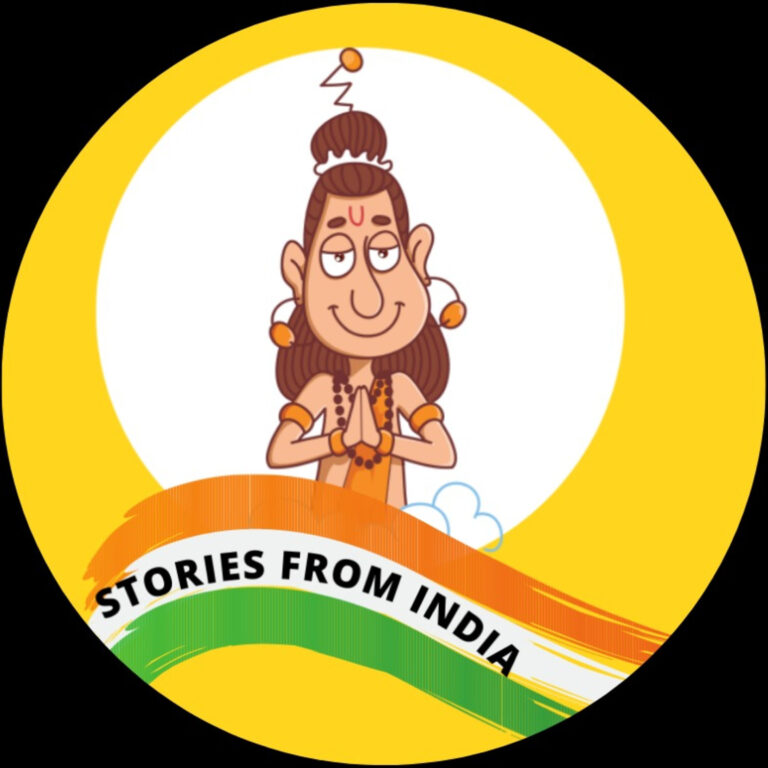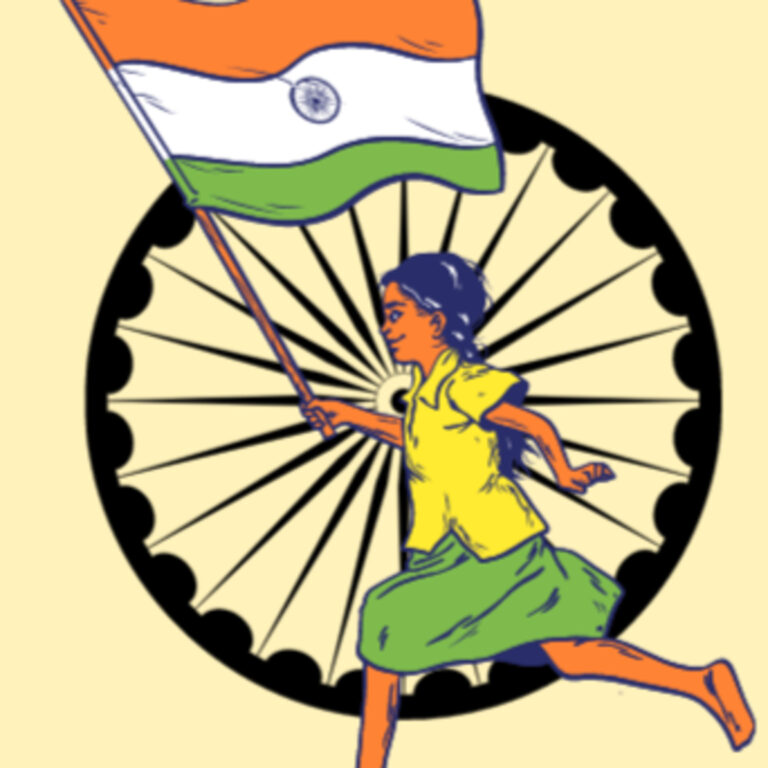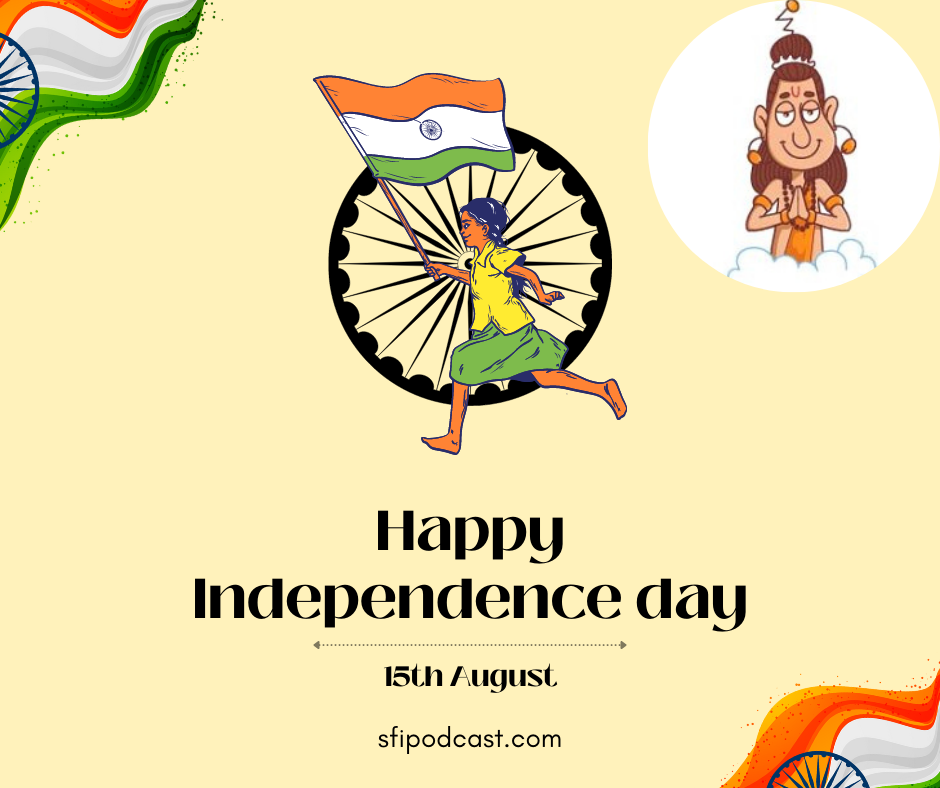Happy Independence Day! Given the special occasion, today’s story is from History. It’s about Kanaklata, a teenage Independence activist from Assam who gave up everything for her country.

I’m the host Narada Muni, and I’m a mythological character myself!
I have the gift of eternal life, and knowledge of the past, the present, and the future. I’m also the son of Brahma, the creator of the Universe. By profession, I’m a traveling musician and storyteller, so the way I’m doing my job is by podcast.
In every episode, I’ll bring you Stories from India from well known Indian Mythological epics like the Ramayan and Mahabharata, to folklore including the Panchatantra, Jataka Tales, Vikram and Betaal, Akbar and Birbal, Tenali Raman, and many other regional folk tales!
An Independence Day Special episode about Kanaklata Barua, a teenage Independence activist from Assam who gave up everything for her country
Transcript and show notes: https://sfipodcast.com/history-kanaklata-ep-217-5-stories-from-india-podcast/
Music: https://www.purple-planet.com
#sfipodcast #KanaklataBarua #Assam #QuitIndia #1942 #Kanaklata #Barua #Pushpalata #MrityuBahini #August15 #IndependenceDay
—
Send in a voice message: https://podcasters.spotify.com/pod/show/storiesfromindia/message


Welcome to “Stories From India”. This is a podcast that will take you on a journey through the rich mythology, folklore and history of the Indian subcontinent. I am Narada Muni, the celestial storyteller and the original “time lord”. With my ability to travel through space and time, I can bring you fascinating stories from the past, the present, and the future. From the epic tales of the Mahabharata and Ramayana to the folktales of the Panchatantra to stories of Akbar-Birbal and Tenali Raman, I have a story for every occasion.
The purpose of the stories is neither to pass judgment nor to indoctrinate. My goal is only to share these stories with people who may not have heard them before and to make them more entertaining for those who have.
Today’s Story
Now, I know I had said that we’d be covering the Panchatantra next. That plan is still on, for this weekend. Because of the special occasion today, and because I had a specific request from one of you listeners, I decided to do a bonus episode. Thanks to Navya’s recommendation, we’re going to cover the story of Kanaklata Barua.
So you know how we cover Myths, Legends, Folklore and History on this show? Today’s story is firmly in the History category. Kanaklata was a real historical person.
Let’s begin in Gohpur in Assam. The year was 1942, and it was mid-September. The exact location is a bit secret, because we’re going to cut the scene to a gathering of conspirators. This was the hideout of the Mrityu Bahini. Translated literally it means Death Squad. The Chief Conspirator was Pusphalata Das, she was the one who had founded this group. Not surprising, she was rather well connected. She knew Nehru’s sister, Vijay Lakshmi Pandit, as well as Mridula Sarabhai. And that was enough to make her a famous person automatically. But being politically well-connected is by itself not enough to set up a Death Army to overthrow the British Raj. Leadership skills are needed too.
And right now, she was using those leadership skills to manage the questions from the crowd.
“Mahatma Gandhi launched the Quit India movement” one lady asked. “But what are we supposed to do, exactly?”
“Well, it’s not like I’m an expert or anything. But I’ve heard Gandhi himself talk about it. And I’ve given the matter a lot of thought. So I can tell you the gist of it. Basically Gandhi wants us to pack up the British Empire’s bags and send it off on on a trip”
“Does that mean we’re starting a Luggage Service?” asked one boy innocently.
“A one way trip. We’re sending them home”
One teenager was quiet “And what if they don’t want to go?” she asked.
It was a great question, and got to the heart of the problem. Gandhi’s activism was centered around non-violence. What were they supposed to do if the British simply refused? It was easy to imagine an officer in a crisply pressed uniform, giving a stern look to the members of the Mrityu Bahini, and saying “No, thank you. You can unpack my bags and then tool down to the kitchen and cook dinner for 12. I’m expecting a few guests. Jolly Good, what?”
Pushpalata tried to explain that what Gandhi had in mind was Civil Disobedience. That meant peaceful protests. And that meant not going to school, not paying taxes, not filing lawsuits, don’t watch any movies.
Great advice, except it was not going to be very helpful. The teenager said that it didn’t really mean much. She wasn’t paying any taxes, she wasn’t taking anyone to court, she certainly wasn’t watching any movies and she wasn’t going to school either.
Bit concerning at her age. Not the movie watching part, I mean the not-going-to-school part.
Pushpalata then remembered this girl. She was Kanaklata Barua. From previous meetings of the Mrityu Bahini, Pushpalata saw something of herself in this girl.
When the founder of Mrityu Bahini had been younger, she herself had organized a protest when Bhagat Singh had been sentenced to hanging by the British. She’d even gotten expelled from school for it. Not something to be proud of if you’re someone like Hermione Granger. But definitely a badge of honor if the school didn’t believe in the concept of Civil Disobedience.
Pushpalata concluded the meeting with the motto that Gandhi had coined – Do or Die.
The meeting was over, but Kanaklata didn’t stop thinking about Gandhi’s motto.
It was simple and straightforward. Those words by themselves may be subject to misinterpretation, but in the context of the Quit India movement, it was clear what he meant. So whether the officers of the British Raj threw a tantrum or not, they would be ejected from the country. And Kanaklata was ready to die trying.
She thought about what she could do. The answer was the flag. The flag at the police station was of the British Raj, naturally. They controlled everything. Law enforcement was just one small, but important part of that. Kanaklata was going to replace the flag, or die trying.
The next morning, she sent off her siblings to school. It was her responsibility naturally, because she was the oldest sibling, and they were all orphans.
She marched to the police station where other members of the Mrityu Bahini had gathered. They had a flag ready of course. And a backup flag just in case. They marched towards the police station.
The police might have been surprised that a lot of citizens were coming in. The officer who was in charge, Rebati Mahan Som, first asked one of the constables to go get extra FIR forms ready. Sounds like they had a major crime wave to deal with here.
But his instinct proved wrong. Because the Mrityu Bahini weren’t trying to enter the police station, they were trying to climb it.
“Ahoy there. That’s just not cricket, I say!” Officer Rebati said again.
But the protesters continued, Kanaklata at the forefront.
“You can’t climb without a ladder, madam. It’s against the law. You might break your neck,” he tried again. But no one was paying him any attention.
Then he saw the flag in their arms and then it finally clicked.
The officer took the drastic action of firing on the lead protestor. Kanaklata was dead instantly. That didn’t stop the protest however.
Another protestor, Mukund Kakoti, took up the flag that Kanaklata had dropped. There was another shot and Mukund fell as well.
That was it. The protest might have ended, but the news of Kanaklata and Mukund Kakoti’s sacrifice enraged protestors and encouraged protests.
Kanaklata Barua is quite the legend in Assam, but she’s unfortunately not very well known outside of the state, when compared to other Independence Activists.
There are statues of Kanaklata in Assam. They are linked in the show notes. Check them out.
Again, let’s celebrate this day by remembering those who sacrificed their lives to win us this independence. Not just Kanaklata but the countless others who lost everything so that we could experience a better country than they did.
Some Notes
A sculpture depicting the scene from the story: Kanaklata Udyan in Tezpur, Assam
A statue of Kanaklata carrying the flag
That’s all for now.
Next Time
In the next episode, we’ll do the Panchatantra as I’d mentioned last time
Feedback
If you have any other comments or suggestions or if there are particular stories you’d like to hear, please do let me know by leaving a comment or a review on the site sfipodcast.com, or tweet @sfipodcast, or reply to the questions on Spotify Q&A. You can also find me on Instagram and Facebook.
Be sure to subscribe to the show to get notified automatically of new episodes.
A big thank you to each of you for your continued support and your feedback.
The music is from Purple Planet.
Thanks for listening and I’ll see you next time!
